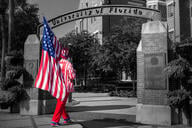You have /5 articles left.
Sign up for a free account or log in.
It seems morbidly appropriate, somehow, that a basketball scandal brought to light two years ago because one player killed another should result in the National Collegiate Athletic Association imposing a modified version of its rarely used "death penalty" on Baylor University Thursday.
Given the seriousness of the violations -- which one NCAA official said brought "incalculable disgrace" to Baylor and to college sports -- and the university's checkered recent history, the Division I Committee on Infractions could have barred Baylor's team from playing at all in the next two seasons. But the panel's chairman, Gene Marsh, a law professor at the University of Alabama at Tuscaloosa, said the committee had "walked up to the edge and then stepped back" from that ultimate penalty because of the university's "honest and very blunt" assessment of its problems once it confronted them.
As a result, the infractions panel instead barred Baylor's men's basketball team from playing all games outside its conference in one of the next two seasons (Baylor officials decided to face this penalty next year, in 2005-6). That was just one of a barrage of penalties -- some of which the university imposed on itself -- that included scholarship reductions, recruiting limitations and five years of probation, the maximum the NCAA hands out. In addition, four former coaches received restrictions, lasting from 5 to 10 years, that will make it difficult if not impossible for them to work at another NCAA institution.
"The coaches' disregard for NCAA rules has tarnished them, the university and intercollegiate athletics as a whole," Marsh said.
The June 2003 disappearance of Patrick Dennehy, then a basketball player at Baylor, and the revelation that he was murdered by a teammate, Carlton Dotson, who pleaded guilty this month, led to an investigation that revealed serious wrongdoing, even though the death did not seem in any way tied to the rule breaking.
At the core of the violations were some flawed decisions by Baylor's former head coach, Dave Bliss, and several assistant coaches. According to Marsh, the coaches recruited to Baylor "athletes of dubious character" who were "incapable" of doing the necessary academic work. Because the coaches were worried that several of the athletes would not be academically eligible to play, they recruited seven players even though the program had only five scholarships to offer.
When all seven athletes became eligible, Baylor's coaches decided to deal with the situation by giving two of the players -- including Dennehy -- money to cover their tuition and costs, a clear violation of NCAA rules.
The coaches then compounded that breach by engaging in an expansive cover-up that involved the players, their parents and many other people. The coaches had the players "act out" what to say before interviews with Baylor and NCAA investigators, the infractions panel said, and even gave the athletes tape recorders so they could practice their "parts."
Marsh said that Bliss, the former head coach, had told the infractions panel that his own actions were "despicable." The assistant coaches, Marsh said, went along with the rule breaking out of deference to Bliss. "The former assistant coaches' loyalty was destructive to their own careers, the student-athletes entrusted to their care and the institution that employed them," Marsh said. The panel concluded that all four coaches violated the NCAA's rules against unethical conduct.
The infractions panel found that Baylor broke numerous other NCAA rules in addition to those related to the situation described above: the athletics department failed to follow its procedures for reporting drug use by athletes, and Baylor basketball coaches broke recruiting rules by giving money inappropriately to youth basketball teams.
Almost lost in the shuffle was a fairly major finding of academic fraud in Baylor's football program, in which a part-time tutor wrote papers for three players. English professors apparently uncovered the violation when two players in different course sections submitted identical papers.
Because Baylor had been found guilty of major NCAA violations in both 1996 and in 2001, the university was susceptible to the association's penalties for "repeat violators," which in common parlance have come to be known as the death penalty. The rules allow the infractions committee to bar a team from competition for up to two years, and NCAA committees have canceled seasons only twice: once for Southern Methodist University's football team in 1987, and in May for MacMurray College's Division III tennis team.
Marsh said the committee considered barring Baylor from playing outright, especially since university administrators acknowledged that they had failed to keep a handle on the program. But the panel's members stopped short, he said, because Baylor officials "took decisive and meaningful action to stop the violations and punish those responsible" and clearly acknowledged their guilt. "They didn't try to be cute, didn't try to polish the apple," Marsh said
Baylor officials accepted the severe penalties. Said its interim president, William D. Underwood: "Baylor supports the committee's conclusion that additional sanctions are an appropriate message that this kind of behavior cannot and will not be tolerated. We appreciate the committee's recognition that Baylor University acted in good faith, has exhibited genuine remorse and has responded to the violations in a decisive and meaningful fashion."





